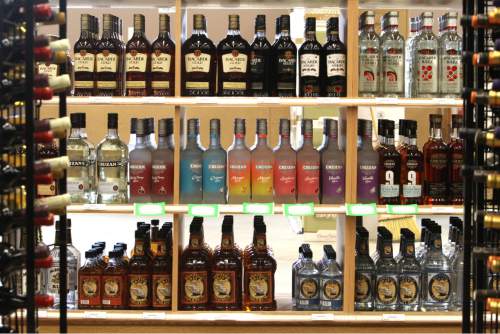This is an archived article that was published on sltrib.com in 2015, and information in the article may be outdated. It is provided only for personal research purposes and may not be reprinted.
If you want to open a beer joint, a reception center or a restaurant with a full bar, the Utah Department of Alcoholic Beverage Control has plenty of state licenses available.
But restaurants that want to sell just wine and beer may soon be out of luck, as the DABC has only six limited-service restaurant permits left.
"We are starting to get low and we are still getting a lot of requests," Nina McDermott, the DABC's director of compliance and licensing, told the state liquor commission earlier this week.
"We don't know when or if we'll run out of limited-restaurant licenses. It depends on how many businesses apply," said DABC spokeswoman Vickie Ashby. "If we do, they will be handled as the club licenses are handled."
In other words: a waiting list.
While not as urgent, there also are only four banquet/catering licenses available and one airport lounge permit left in the state.
—
There is an easy remedy for the shortage, said Epic Brewing's Peter Erikson, a member of the DABC's Advisory Board. "Ease the quota restrictions. They are problematic and hinder the economy."
For many years, the Utah Legislature has tied the number of state liquor licenses to population. The number of limited-service restaurant licenses, for example, is determined by dividing the state population by 7,493. With nearly 3 million people in Utah, that means the state can have 399 limited-service permits.
One more limited-service restaurant license will become available in July via a population increase, Ashby said. And if a restaurant closes or surrenders its license, that permit also would go back into the pool.
While no one is declaring a shortage of full-service restaurant licenses — which allows restaurants to serve heavy beer, wine and spirits — they aren't necessarily plentiful, with only 37 remaining. Utah allows one full-service license for every 4,925 residents. Currently, 659 restaurants have them.
There are similar population requirements for taverns, reception centers, banquet/catering facilities and clubs. The only exception to population-based licensing limits is for restaurants and recreational centers, like bowling alleys, that serve only 3.2-percent beer by weight.
In 2012, when there was a backlog of 31 applicants at the DABC, the Legislature added 90 new liquor licenses — 50 full service and 40 limited service.
Cost may be one reason restaurants prefer the beer and wine license. After a $330 application fee, the limited-service license costs $825, with an annual renewal fee of $605, according to data posted on the DABC website.
A full-service restaurant license has an initial cost of $2,200 and a renewal fee of $935 to $1,925, depending on how much liquor is sold. The $330 application fee is the same.
With either restaurant license, owners are required to build a bar structure — sometimes called a "Zion Curtain" — to shield the mixing and pouring of alcohol from the view of minors. Both licenses also require patrons to order food when buying alcoholic beverages.
—
Waiting lists are nothing new for the DABC. For several years, businesses have typically had to wait up to a year to get a club — or bar — license. On the extreme end, Tim Ryan, owner of 'Bout Time Pub & Grub, waited nearly two years before recently being granted a club license for his Park City store. (See story on right for more details.) All 380 club licenses have been granted and 15 businesses are on the waiting list.
One or two permits become available each month, either through increased population — state law allows one club for every 7,850 people — or business closings. There have been some months when the liquor commission has no permits to give.
Businesses that don't want to wait — and have deep pockets — can buy a license under a law that went into effect last July.
Under the new provision, a business owner with a state alcohol license can sell it to a qualified buyer — something previously prohibited — as long as the license remains in the county it was issued and there are no unpaid creditors or tax debts on the property.
Many in the industry believe that allowing such sales — the coveted club licenses have been sold for $30,000 to $100,000 in recent months — hurt small-business owners.
"It's not good for the consumers, it makes it so only the chains get the licenses," Erikson said, "and consumers don't get choices that include local entrepreneurs who are unique. "



